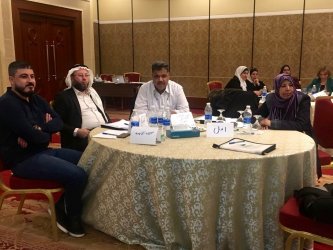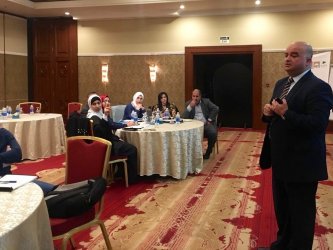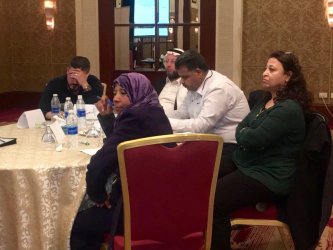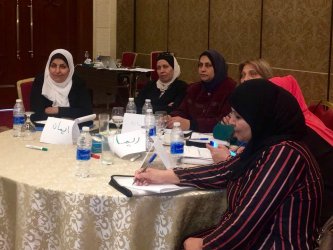-
CBOs Meet with Potential Donors during Civil Society ...
CBOs Meet with Potential Donors during Civil Society Project's Final Workshop
On 23 April, 22 Community-Based Organisations (CBOs) completed their series of capacity-building workshops as part of the Middle East Partnership Initiative’s (MEPI) civil society project carried out by the West Asia-North Africa (WANA) Institute.
During the final workshop on 22 and 23 April, potential donors met with the participating CBOs from Karak, Zarqa, Mafraq and Amman to discuss opportunities and provide critical feedback to the projects the CBOs proposed.
The topic of the final workshop was project budgeting. Other topics addressed in different sessions throughout the project were community development, human rights, research methods, problem assessment, project design and proposal writing, and monitoring and evaluation.
After each training, the CBOs carried out a work assignment under the supervision of the WANA Institute’s team. This way the project guaranteed that the CBOs could practise and implement the theories learned during the workshops.
Amal Al Sayed from the Society for Community Development was pleased with the benefits of the programme. The workshop on developing financial and administrative policies was particularly useful to her. “In addition to practical skills such as project design, we benefited from the WANA Institute’s project through the networking opportunities with large international institutions and important local institutions such as the Hayat-RASED Centre. This led to our collaboration in a joint project with the Ministry of Social Development.”
Mahmoud Nabulsi, the WANA Institute’s Civil Society team leader, said that the programme “succeeded in setting up networking opportunities between associations and donors.” He added that “WANA will continue cooperating with the associations and involve them in future programmes that contribute to their development.”
Dr Karim Al-Thabet, Programme Director of the German Foundation for Civil Peace Service in Jordan, said that his organisation's programme focuses on CBOs at the governorate level. He called on associations to recognise their identity within their community and legal framework, and to “continuously communicate with their local communities by providing them with services.”
“The WANA Institute’s training has contributed to building the capacity of these associations and supports the process of representative communication," he added. "It is important for CBOs to cooperate with existing local bodies. To achieve the goals of their programmes and donors optimally, the associations must change their structure in terms of quantity and quality, by increasing the number of their employees and volunteers.”




